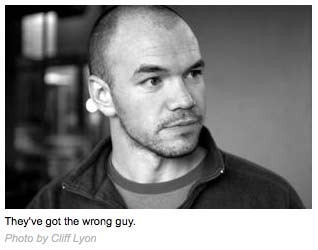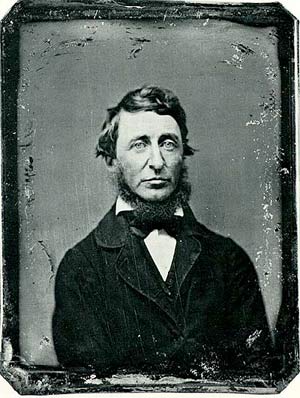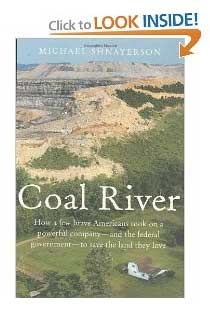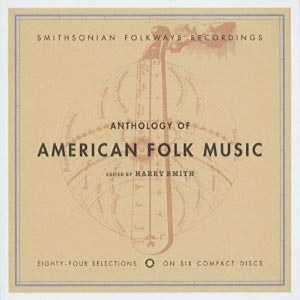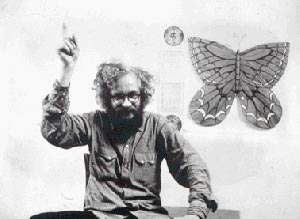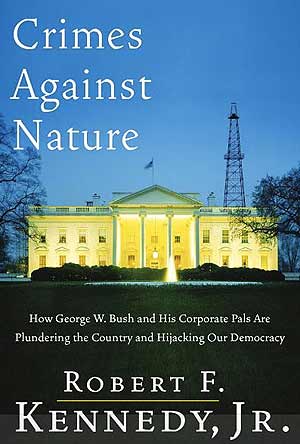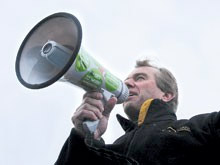Legal
American Electric Power v. Connecticut, argued earlier this week, spurs debate over the role of the courts in addressing climate change.
The Court heard oral argument in American Electric Power v. Connecticut on Tuesday. The case raises questions about the role of the federal courts in addressing climate change–a subject that has interested academics as well. Professors David Markell and J.B. Ruhl address the issue empirically by reviewing every climate change case brought through December 31, 2009, to determine whether courts are serving as “battlefields” in the “climate fights.”
A forthcoming article in the Yale Law Journal by Benjamin Ewing and Douglas Kysar argues that climate change litigation illustrates how tort law can prod political actors to address social problems. And John Wood’s article in the Environmental Law Reporter runs through the arguments regarding displacement of public nuisance claims in the context of climate change. All three articles contend that climate change litigation raises important questions about the relationship between the judiciary and the political branches of government. We’ll soon learn the Court’s views on these questions as well.
See: SCOTUSblog | American Electric Power Co., Inc. v. Connecticut.
See: Markell, D., and J. B. Ruhl. “An Empirical Survey of Climate Change Litigation in the United States.” Envtl. L. Rep. News & Analysis 40 (2010): 10–644. Print.
See: Ewing, B., and D. A Kysar. “Climate Change, Courts, and the Common Law.” Print.
See: Wood, John. "Easier Said than Done: Displacing Public Nuisance when States Sue for Climate Change". (February 17, 2011). Environmental Law Reporter, Forthcoming. Available at SSRN: http://ssrn.com/abstract=1763359
Let's consider for a moment the targets the federal government chooses to make an example of.
So far, no bankers have been charged, despite the unmitigated greed that nearly brought the world economy down. No coal or oil execs have been charged, despite fouling the entire atmosphere and putting civilization as we know it at risk.
But engage in creative protest that mildly disrupts the efficient sell-off of our landscape to oil and gas barons? As Tim DeChristopher found out on Thursday, that'll get you not just a week in court, but potentially a long stretch in the pen...
Bill McKibben
Bill McKibben is the author of a dozen books on the environment, a scholar in residence at Middlebury College, and founder of 350.org. He also serves on Grist’s board of directors.
See: Tim DeChristopher | Bidder70.
See: Gas Drillers Plead Guilty to Felony Dumping Violations
See: Student Disrupts Government Auction of 150,000 Acres Of Wilderness For Oil & Gas Drilling.
See: The Need for Mass Mobilizations
See also: Video - 350.org: Because the world needs to know.
See: Amy Goodman and Juan Gonzalez. "Environmentalist Tim DeChristopher Found Guilty of Sabotaging Oil and Gas Auction; Faces up to 10 Years in Jail." Democracy Now!. March 4, 2011.
Photo by Alex Wong | Getty Images. See source here.
Amicus Curiae
Faith Based organizations offer information relevant to the Supreme Court deliberation on the matter of Connecticut vs. American Electric Power. 2011-03-18.
Amici curiae are fourteen faith-based organizations that are active participants in the ongoing attempt to respond to global climate change and have a strong interest in developing limits on greenhouse gases, which are the primary cause of global climate change.
Amici represent a broad spectrum of Catholic, Protestant, and Jewish communities. Although they differ on many matters of faith and policy, they are united in their concern about threats to the environment. They believe that human beings are stewards of God’s Creation and that humans have a moral obligation to prevent and mitigate harm to the planet, to our fellow humans, and to all of God’s creatures.
An amicus curiae (also spelled amicus curiæ; plural amici curiae) is someone, not a party to a case, who volunteers to offer information to assist a court in deciding a matter before it. The information provided may be a legal opinion in the form of a brief (which is called an amicus brief when offered by an amicus curiae), a testimony that has not been solicited by any of the parties, or a learned treatise on a matter that bears on the case. The decision on whether to admit the information lies at the discretion of the court. The phrase amicus curiae is legal Latin and literally means "friend of the court".
See: Gas Drilling Discussion (Suggested Agenda for) : Biblical and Theological Considerations
This video shows Texas Black Angus cattle drinking from drilling sludge pits at two different drilling sites in Denton County. I have witnessed cattle drinking from sludge pits regularly over the past few years.
Unlike most other states, Texas law does not require that sludge pits be lined or fenced, but it does require the pits be "cleaned up" within 120 days after completion of the well.
There are many sludge pits in Texas that never get cleaned up. These are a threat to wildlife, livestock, soil and our drinking water.
See Bluedaze by Sharon Wilson (TXSharon)
A Project in Cooperation with the Thoreau Society.
The Thoreau Reader - Annotated works of Henry David Thoreau
While Walden can be applied to almost anyone's life, "Civil Disobedience" is like a venerated architectural landmark: it is preserved and admired, and sometimes visited, but for most of us there are not many occasions when it can actually be used.
Still, although seldom mentioned without references to Gandhi or King, "Civil Disobedience" has more history than many suspect.
In the 1940's it was read by the Danish resistance, in the 1950's it was cherished by those who opposed McCarthyism, in the 1960's it was influential in the struggle against South African apartheid, and in the 1970's it was discovered by a new generation of anti-war activists. The lesson learned from all this experience is that Thoreau's ideas really do work, just as he imagined they would.
See: The Higher Law: Thoreau on Civil Disobedience and Reform by Henry David Thoreau, edited by Wendell Glick, with an introduction by Howard Zinn.
As a result of his writings and personal witness, we are the heirs of a legacy of creative protest. - Martin Luther King, Jr, Autobiography
This work is included in Fracking Resource Guide as an homage to the many individual voices and blogs I will continue to read that help the world stay informed about the dangers of hydrofracking.
I will join you at the barricades. Drilling isn't safe.
See: Essay by Peter Suber. "Civil Disobedience".
...The Nuremberg principles require disobedience to national laws or orders which violate international law, an overriding duty even in (perhaps especially in) a democracy.
Climate Ground Zero started out as a campaign against oil and tar sands in Montana and Canada. Upon requests by local activists working to end mountaintop removal coal mining, Climate Ground Zero moved to Rock Creek, West Virginia.
Coal River Mountain was the last mountain to remain untouched by mountaintop removal mining in the Coal River Valley. Climate Ground Zero’s direct action campaign took off when Coal River Mountain was clear-cut in preparation for mountaintop removal in February of 2009. Since then over 150 people have been arrested in various actions on Coal River Mountain and other mountaintop removal sites in West Virginia.
Climate Ground Zero is not an environmental organization; it is an ongoing campaign of non-violent civil resistance in southern West Virginia to end mountaintop removal. Here at Climate Ground Zero we believe that the irrevocable destruction of the mountains of Appalachia and its accompanying toll on the air, water, and lives of Appalachians necessitates continued and direct action.
In West Virginia, an overwhelming majority of residents are opposed to mountaintop removal mining. However, political interests are highly invested in the coal industry and the EPA and the West Virginia DEP refuse to take real action to protect the environment and the people of West Virginia.
In order to stop mountaintop removal, we need to awaken the country to the devastation that mountaintop removal inflicts on one of the most biodiverse regions in the world, Appalachia, and its people. Since Climate Ground Zero came to West Virginia in 2009, hundreds of activists have come to the coalfields and stood with the residents of West Virginia to demand an end to the destruction.
Climate Ground Zero is a project of the American Forest Alliance and works in cohesion with Mountain Justice, a regional network of organizations in Kentucky, Tennessee, Virginia, and West Virginia, that seek the abolition of mountaintop removal in Appalachia and throughout the country.
July 25, 2009
From Publishers Weekly
Through vivid first-person reporting and a thorough culling of court transcripts, newspaper clippings and corporate reports, Vanity Fair contributing editor Shnayerson (The Killers Within) has crafted an incriminating indictment of the Appalachian King Coal industry in West Virginia, and of the man he defines as its rapacious kingpin, Massey Energy's CEO, Don Blankenship.
The author's sympathies lie clearly with opponents of mountaintop mining, most prominently young attorney Joe Lovett and citizen activist Judy Bonds. Both have fought against a form of mining that shears off the tops of hills and dumps rubble into valleys and streams—a process abetted by the collusion of the state's often-lackadaisical Department of Environmental Protection, the U.S. Army Corps of Engineers' propensity to grant stream-destroying permits without oversight and the easing of environmental controls by the Bush administration.
Shnayerson's compelling take on toxic mining methods and their heartrending impact on Appalachian inhabitants and their culture, has a wider focus than Erik Reece's 2006 title, Lost Mountain, which reported on one mountaintop's destruction, and strong echoes of the stomach-churning legal machinations recounted in Jonathan Harr's 1995 bestseller, A Civil Action.
See: Michael Shnayerson web page.
See: Marsh Fork Elementary: Journey Up Coal River | A Community and Strip Mining
See: WATER | Aurora Lights. Public Health & Coal Slurry - Water Quality ::: Journey Up Coal River
See: Tree spiker : from Earth First! to lowbagging: my struggles in radical environmental action
See: Leveling Appalachia: The Legacy of Mountaintop Removal Mining
See: Environmental Issues and Challenges in Coal Bed Methane Production
See: Climate Ground Zero
See: Mountaintop Removal
I attended the Energy Conference 3/31 - 4/2/2011.
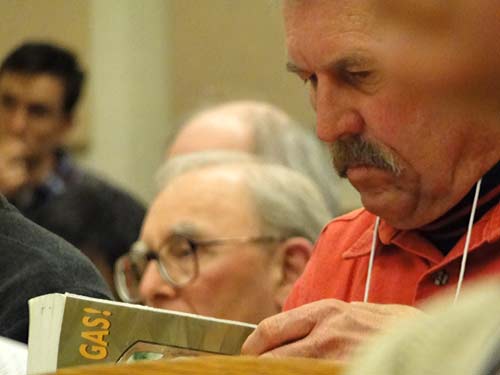
Getting serious about natural gas at the 2011 Cornell Energy Conference.
Photo by Neil Zusman.
See: Cornell University Law School - 2011 Energy Conference
First posted the photographs on 4/8 and liked how it played against Dylan and the Dead (1989) "All Along the Watchtower", but copyrights... I couldn't use Dylan and the Dead on YouTube- rock it Google.
But now I think the ballads about John Henry resonate for me - the classic man against machine tale, and I think that this conference was about that and more (mechanical, chemical). It needs a ballad. Sort of like the one about digging a tunnel for the railroad...but more about the one in progress, digging for the truth. The music is from the great Anthology of American Music. Vol. 2. (Neil Zusman, 2011-04-19).
“John Hardy” stands right next to “John Henry” as one of the most popular “figures” in the folk song tradition. (In the Anthology too, they are next to each other). In fact, many people combined the two songs and many scholars confused the two characters as Alan Lomax once said. Both were black railroad workers but their story is quite different.
The historical John Hardy killed a man during a crap game and was hanged for his crime. Before his execution he wanted to make peace with God so they sent a preacher and went to the river to baptise him. On the scaffold he claimed his repentance for his crime and probably sang some verses that would be included in the ballad that bore his name.
Harry Smith, ed. Anthology of American Music. Vol. 2. Smithsonian Folkways Recordings. 1997. "The Williamson Brothers & Curry: Gonna Die With My Hammer in My Hand".; "The Carter Family: John Hardy Was a Desperate Little Man."
Steel-drivin' men like John Henry used large hammers and stakes to pound holes into the rock, which were then filled with explosives that would blast a cavity deeper and deeper into the mountain. In the folk ballads, the central event took place under such conditions.
Eager to reduce costs and speed up progress, some tunnel engineers were using steam drills to power their way into the rock. According to some accounts, on hearing of the machine, John Henry challenged the steam drill to a contest. He won, but died of exhaustion, his life cut short by his own superhuman effort.
Carlene Hempel, Deb Procopio, Dan Shaver, Beth Novak. John Henry The Steel Driving Man. Electronic Resource. Accessed 2011-04-19.
Discover this great Anthology of American Folk Music by Harry Smith here and an even more amazing resource exploring it:
Gadaya. The Old Weird America. "Gonna Die with a Hammer in my Hand." Electronic Resource. Accessed 2011-04-19.
See: Congress Launches Investigation Into Gas Drilling Practices
Special Community Forum:
Thursday, March 31, Friday, April 1, Saturday, April 2, 2011.
Cornell Law School | Free Admission
Natural gas drilling using hydraulic fracturing ("hydrofracking") may be poised to begin in Upstate New York.
...This heated issue is part of the larger state, national, and international energy picture. The conference will use natural gas drilling as a lens to explore energy policy, the global energy market, and the integral role the law can and must play in creating energy security and ensuring a sustainable future.
...The conference will explore, among other topics, the legal issues associated with natural gas drilling and energy policy, different scientific perspectives on how clean and sustainable natural gas is, alternative clean energy sources, and the potential risks and benefits of shale gas development in Upstate New York.
PLEASE NOTE: Seating is limited at most panels, and registration is first-come, first-served. Registrants not seated in the amphitheater where the panel is taking place will be seated in an adjacent amphitheater where the panel will be broadcast live via simulcast. Contact Ben Tettlebaum, bwt32@cornell.edu, with questions or concerns.
In this powerful and far-reaching indictment of George W. Bush's White House, Robert F. Kennedy, Jr., the country's most prominent environmental attorney, charges that this administration has taken corporate cronyism to such unprecedented heights that it now threatens our health, our national security, and democracy as we know it... --from the book jacket.
Robert Kennedy Jr. says we the people have the right to protect our commons.
Photo by Shadia Fayne WoodSee: Sarah van Gelder. Yes Magazine. May 27, 2010. "Protecting our Water Commons: Interview with Robert Kennedy Jr."
van Gelder: How important is the public trust doctrine in enforcing the idea that the waters are a commons and that ordinary people have a right to it?
Kennedy: There are two ancient laws that underlie all modern environmental laws: One is the nuisance doctrine that essentially says you can use your property any way you want, but if you pollute and it escapes your property and goes onto somebody else’s property, you’re violating the law.
The other is the public trust doctrine, which says you can’t do anything that is going to diminish the commons, which includes any property that is not susceptible to private property ownership, like air, water, the fisheries, wetlands, wildlife, the wandering animals, rivers, streams, shorelines, aquifers, underground rivers, etc. Everybody has the right to use the commons, but nobody can use them in a way that diminishes their use and enjoyment by others.
This is ancient law that goes back to Roman times when every citizen—rich or poor, humble or noble, African or European—had a right to cross the beach, throw in a net, and take out a share of the fish. And the emperor himself couldn’t stop them.
The first thing that happens in a tyranny is the privatization of the public trust by powerful entities...
See: Flow - The War Between Public Health and Private Interests
See: Robert F. Kennedy Jr. Feb. 19, 2004. The Nation. "The Junk Science of George W. Bush".
See: Robert F. Kennedy, Jr. Mobilizes on Mountaintop Removal
See: Mountaintop Removal Redux: Bobby vs. Blankenship II
See: New Starpower in the Fracking Fight
See Also:
Barlow, Maude. 2009. Blue Covenant: The Global Water Crisis and the Coming Battle for the Right to Water. The New Press, June 1.
Ivins, Molly. 2003. Bushwhacked : Life in George W. Bush's America. 1st ed. New York: Random House.
Shnayerson, Michael. 2008. Coal River. 1st ed. Farrar, Straus and Giroux, January 8.







